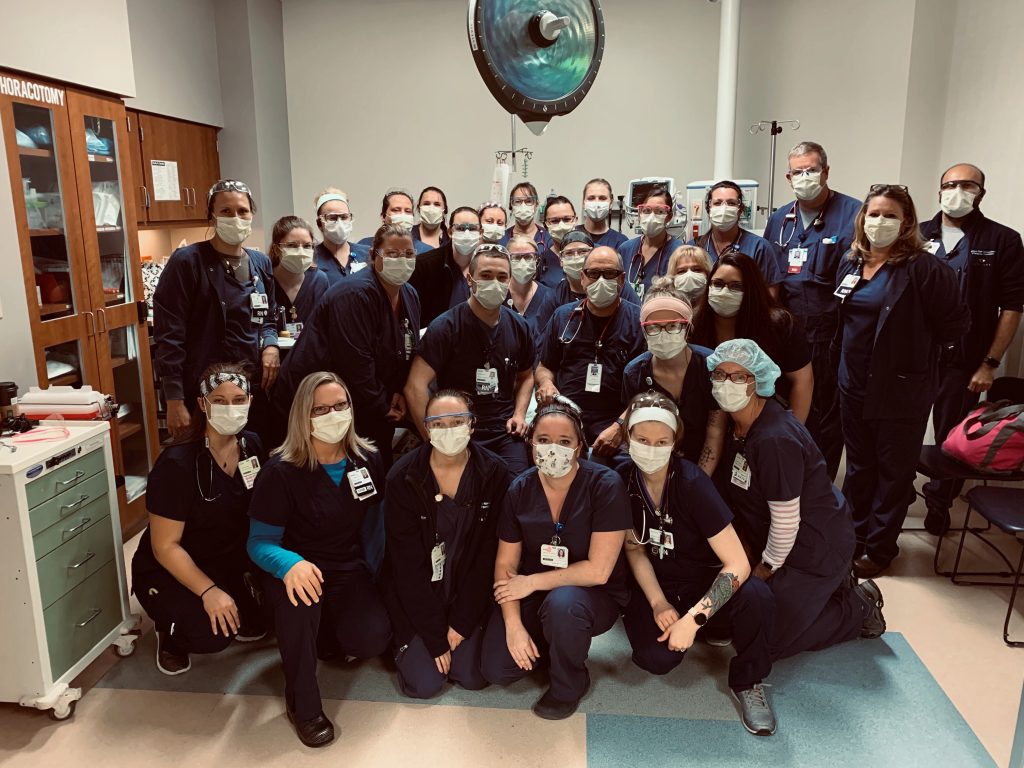The Spring/Summer 2020 issue of Crossroads featured heartfelt reflections from alumni on their experiences during the COVID-19 pandemic.
Brooke Hensley ’14, in the photo above with colleagues, is an emergency department nurse at Sentara RMH in Harrisonburg, Va. She writes: “Throughout the last month, I have seen an increase in teamwork amongst healthcare professionals and witnessed the entire community coming together … There has been an outpouring of support and prayers from the community, which gives me, as well as other healthcare workers, the strength and courage to be on the frontline in this unpredictable journey, knowing that we are all in this fight together.”
YUN SHEN SEM ‘19 / Fuzhou, Fujian, China
Yun is a pastor with Luoyuan Christian Church. From correspondence with EMU, 2/14/2020.
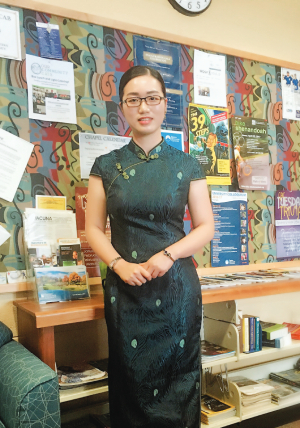
All churches in China were closed down for Sunday service and all gatherings from January 26. Chinese officials have closed transport within and out of Wuhan and other cities in Hubei province, including buses, subways, trains, and the airport. Also, my city has closed transport within and out of the city, so most people can only stay home and cannot go back to work. My church began Sunday service online with WeChat for four weeks. For the young people, we also have a small group online. For the old people, they do not use the internet very much, so they can not join Sunday service and the small group online, and we also cannot visit them. Moreover, we also do not know how long we will need to have Sunday service online; it depends on government policy. Please pray for my country, my church, and me.
WORÉNDIAYE MA‘13 (CONFLICT TRANSFORMATION) / Dakar, Senegal
Woré is the country project manager for the Women’s Voice and Leadership Project, an initiative in 32 countries financed by the government of Canada.
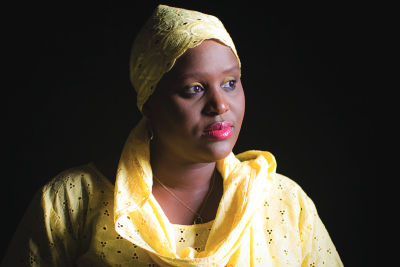
For me, facing this pandemic initially meant understanding the problem and finding the serenity and balance to address it at a personal level. It was also about getting the confidence and strength to support my team members, to give them the tools to adapt at the individual, community and national level, while creating a certain sense of global solidarity.
As we immediately started working from home, my team and I quickly designed an intervention strategy with our 25 local partner organizations in which we tackle the impact of COVID-19 on women’s and girls’ rights: to address the increase of domestic violence by putting in place a mechanism to protect women and support women health care providers including trauma healing. Our intervention also emphasized strong advocacy for a considerable number of women to be included in the government’s COVID-19 Response Group. Although only five women have been selected by the president out of 30 on the committee, we are still working on strong advocacy with women civil society organizations for gender-sensitive budgeting, so the needs of women living all forms of vulnerability can be considered.
DR. PHIL ZAPANTA ‘96 / Lorton, Va.
A colonel in the U.S. Army Reserves Medical Corps, Phil is the otolaryngology residency program director and associate professor of surgery at the George Washington University School of Medicine and Health Sciences.
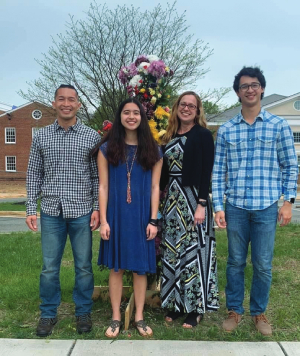
COVID-19 has brought many personal and professional challenges. Due to my military background and professional medical training in Washington D.C., I have learned how to deal with mass events such as 9/11, chemical and biological warfare, the threat of Ebola, and now it’s COVID-19. However, my preparedness doesn’t eliminate the anxiety that accompanies each of these events. Other than my faith in Christ, my family brings me sustenance and sanity during this time. Last summer, the US Army deployed me to Iraq as an ENT trauma surgeon. While I enjoyed serving my country in this capacity, I missed out on family time with my wife, Anne Charbeneau Zapanta ’97; son Jonny, a sophomore music and worship major at Liberty University; daughter Rebekah, a sophomore in high school; and our crazy, old-man dog, Jack. Now I am catching up on missed family time. So while COVID-19 has brought countless hardships, I am also viewing this as a blessing in disguise. Life in D.C. (and everywhere else) basically changed after the events of 9/11. In the same way, life after this will be different. However, all of us are resilient and we will persevere.
JEANNINE UZEL MSN ‘18 / Richmond, Va.
Jeannie directs the Office of Public Health Nursing at the Virginia Department of Health. Excerpted from a conversation with Professor Emeritus Ann Hershberger.
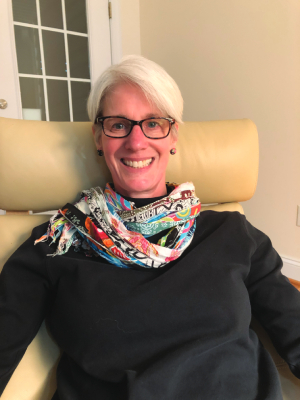
By early February, we knew we were in for the long haul with COVID-19. However, our public health professionals and nurses have risen to the occasion. We scaled back our clinics but maintained essential services. We developed ways to continue to serve our high-risk maternity and pediatric clients though tele-health home visits and have continued our comprehensive harm reduction services. Despite these actions, we realized we needed more help. On a video call with school nurses across the state, I asked for their help and they responded in droves. Student nurses, including EMU student nurses, have helped in our call centers. Retired epidemiologists, nurses, pharmacists, physicians, and others are helping manage outbreaks, providing care in nursing facilities, and assisting with testing and contact tracing… I am grateful and humbled by their generosity.
In a world that so recently seemed divided, the outpouring of support from volunteers has been overwhelming. I have seen communities looking out for one another and people offering to help in any way possible. Worship is continuing through electronic platforms from our homes, which seems to bring us closer together than if we were in the same building. May these glimpses of grace in these dark times sustain us.
ALYSSA GREEN ‘14 / Broadway, Va.
Alyssa teaches kindergarten in Rockingham County Public Schools.
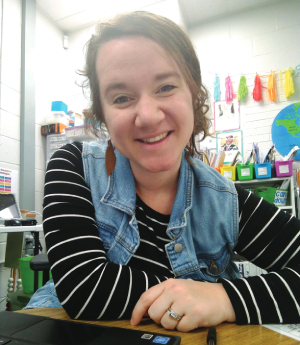
Place teachers in a classroom full of 20 five-year-olds and we can make magic happen! Putting us behind a screen and working remotely is a whole other story. I thrive in hands-on mode and this is very much a hands-off time, while communicating and responding to my students as much as possible and balancing my own toddler at home! Right now, I am sending out weekly plans with my Kindergarten team, providing families with activities that the kids can mainly do independently. We realize that parents are most likely at home working and are trying to provide a good balance of work that needs an adult’s help and work that doesn’t. We have created a lot of things that involve the kids looking around their house, writing things down, finding outside, or reading in fun places and spaces. We are sharing our weekly plans on our Kindergarten google site we created. I am also sharing tips and tricks on my social media page, “The Green Garten.” I am trying to provide a space for families to realize that learning is all around and their entire day doesn’t have to be structured and planned like our school day is. Cooking with your child, sorting laundry with your child, and even going for a walk outside are all learning opportunities.
RJ OCAMPO ‘19 / Virginia Beach, Va.

In September 2019, I decided to jump into the world of Emergency Medical Services. I was ready to be there during people’s scariest moments and serve my community. Never did I think that I would also be fighting a deadly virus a few months later that would shake the world to its core. It is difficult adjusting to new protocols, assessments, and orders all while learning the basics. For a while it felt like my world was spiraling out of control. My confidence and skills are tested daily, but my faith has been my saving grace. Through the encouragement of family, the Virginia Beach EMS community, and my Lord Jesus, I’ve been able to continue to serve my community without fear. My family has been praying daily and proclaiming the words from Psalm 91 over ourselves. This simple act has been strengthening our spirits and giving us hope.
JARED YODER ‘96 / New York, N.Y.
Jared is an administrator at Columbia University Irving Medical Center.
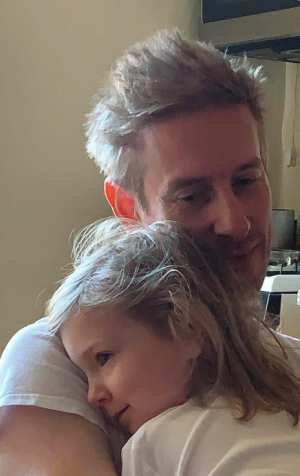
A number of colleagues within the Patient Services Department have had COVID and a few of them lost loved ones. Death surrounds us and is forced on us as healthcare workers despite the fact that we want to be done even talking about it. I am jolted back to reality every time I walk in to work past the two refrigerated semi-truck trailers just outside the back door tent. The analogy goes like this – we have to swim across open water and back every day for our livelihood. It had previously been protected waters but now it’s shark infested and the water is red. I wonder who is next in this insidious lottery? This weighs very heavy on New Yorkers because there seems to be no escape. We hate waiting it out and cowering in isolating fear. However, I am so grateful to know my wife, two kids and I never needed hospitalization after contracting COVID-19. Also grateful NYC is past the peak. You should hear the daily 7 p.m. standing ovation for the essential workers! Every day it gets louder and longer! People are amazingly resilient, finding hope in such creative ways and some even finding that God is still sovereign. Yea though we walk through the valley of the shadow of death, we will fear no shark, for you are with us!
ERIN FREEMAN ‘14 / Pittsburgh, Pa.
Erin is an admissions counselor at Humane Animal Rescue
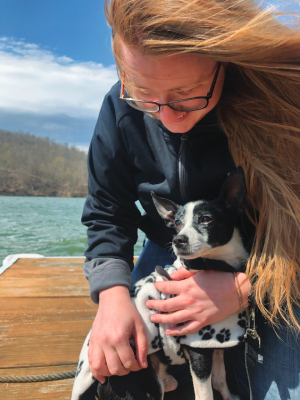
The day before Pennsylvania shut down, I did an animal shelter intake for a senior chihuahua mix. He was emaciated, his white spots were brown, he smelled like he’d been living in a basement. He trembled at sudden movements and new people, but with some coaxing, he sniffed my shoes, took treats from my hand, and curled up in my lap. My partner, Jess, dropped by with lunch at just the right time; she offered that we could foster for a couple of weeks and help him regain his health before he went up for adoption.
He came home with us during an onset of rapid change and uncertainty. He put on weight as our work schedules shifted; his ulcers healed as we worried about our families across the state. Some- time during the first night, while he was snuggled in a chihuahua nest at our feet, I said the word “spoon” wrong, and Jess decided his name would be Spoon.
Spoon gained half his body weight in the first week and became quick friends with our four cats. He loved wearing sweaters and riding in the car. He grew more energetic and started to play. When Jess and I both confirmed that we were “essential” and would be able to keep our jobs, we decided to adopt him ourselves. Now we’re seven happy creatures sheltering-in-place in a small, bright apartment. And I am lucky to have a home, a partner, and now a Spoon that continue to be a refuge.
KEVIN KING ‘81 / Lititz, Pa.
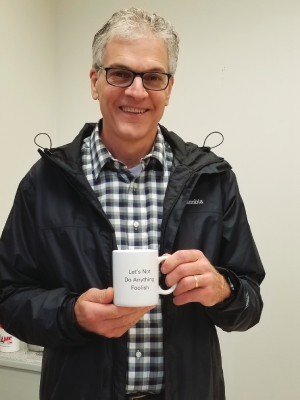
I work for an organization that does things. Mennonite Disaster Service volunteers get people back home. Where faith is put into action. But in this disaster we are told to stay home. That is hard when the hammer doesn’t ring hope. Although I wanted to believe that COVID-19 would not touch Karen and me, the ever-burgeoning number of cases means we must pay attention. So, this is different. It is not localized like an earthquake or hurricane or flooding – there is not one specific state or province that we can rush to aid. Rather, this disaster is personal – each and every one of us will experience its impact in some way or another.
We are all disaster survivors.
So while I work from home I am hearing the quiet response from our volunteers in unique ways. Things like making plexiglass shields for Ten Thousand Villages stores, giving PPE items out of their tool trailers to the local clinic or hospital, sewing cloth face masks and gowns, volunteering in local food pan- tries, shopping for an elder person, and the list goes on.
What is not different? As usual, the most vulnerable among us will be hit the hardest and take the longest to recover. For many members of congregations, the spread of COVID-19 is changing their household economics, and as house- hold economics change, so, too, are congregational economics. Many of our people simply have less to give, and the suspension of in-person worship services has meant that no offering plates are being passed around. As a response our board approved a grant of $350,000 to Everence to form a COVID-19 Congregational Relief Fund.
Disaster survivors are resilient. We will get through this. With God’s help. Sometimes the hammer lays still but hope arises.
BENJAMIN BOLANOS ‘95 / Palo Alto, Calif.
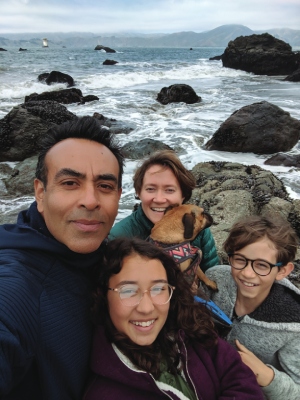
Depending on the week or the day, I tell myself a different story. Before I log in to my work online [as a history and sociology teacher at Palo Alto High School], I read the news, watch Governor Cuomo’s update, or review the data on the latest COVID-19 trends in California and elsewhere. I feel immediately anxious. My heart rate climbs. I begin to sweat. I am angry and simultaneously heartbroken as I watch the most vulnerable suffer from this virus. I worry about the elderly and the poor. I worry about whether my wife will easily contract the disease as an ER nurse, given her previous battle with cancer and chemo. Will she die from this? Will I? What will happen to my children? Will we even survive this? Will this save or destroy our “democracy?” What if it’s even worse when the second wave hits? What if Trump…
And yet on other days, I tell myself this story: That I feel hopeful about
the future. I am hopeful because the pandemic has revealed to us a new way of living that may save us from our capitalistic and environmentally destructive culture. I am hopeful because mother earth is fighting back. She is holding a mirror to us and unveiled what is sacred in this world. For us sacredness is help- ing our undocumented neighbors who have lost income and cannot access the basic necessities they need to survive. Sacredness is witnessing kind strangers helping other strangers in their communities. It is asking “What do you need?” to our mailman or grocery store cashier or unhoused person sleeping on the sidewalk. Sacredness is changing the status quo to create a more just society. So which story do I choose to tell from now on? Both. I wish I could just say, without a doubt, the latter. But that’s not the reality we live in. Maybe we need the fear to find hope in this time. I imprinted a verse my late father always found solace in on one of my surfboards as a reminder of what it means to struggle and endure. From Romans 5:3-5, “…we also glory in our sufferings, because we know that suffering produces perseverance; perseverance, character; and character, hope.”
RACHEL BENSON ‘14 / Steeles Tavern, Va.
Rachel is an RN in community mental health at a crisis stabilization unit.
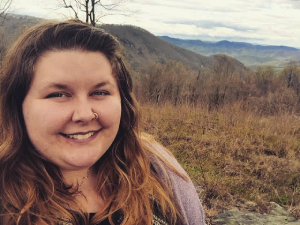
Due to the rising need for acute psychiatric hospital beds, our unit has been converted to a quarantine zone to facilitate state psychiatric hospital patients’ transition to community treatment. The typical functions of our program have been expanded to provide essential treatment and holistic care to high acuity clients with profound mental health and medical needs. We have been prepared to assume care for COVID-19 positive clients, despite lacking what would ordinarily be considered ideal personal protective equipment, adequate staffing, and other useful medical resources.
These changes have had a powerful impact on my nursing role and my personal life, necessitating adaptability. More of my work time is spent teaching my coworkers medical skills and proper safety techniques. I advocate assertively for the health and safety of the clients and staff at my place of employment, regardless of the hierarchical power structure in place. Members of both my professional and personal communities seek information and advice from me, and providing both comfort and encouragement to those around me while remaining realistic has been extraordinarily difficult. Although I experience trepidation due to the risk of contracting COVID-19 myself or exposing my family to the virus, I am also reminded daily of the value of my role in this pandemic.
AMY MARSICO MA ’09 (CONFLICT TRANSFORMATION) / Brooklyn, N.Y.
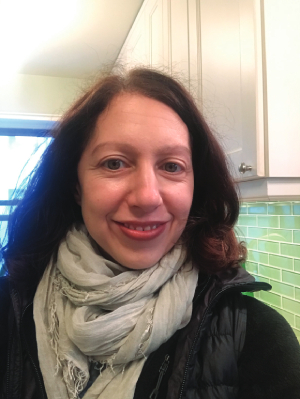
While the pandemic is an unprecedented crisis, it is also an opportunity to recognize our inter-dependence, strengthen social cohesion, and act on our shared humanity. I have seen this play out on a local level in Brooklyn where I volunteer as an intake administrator for a mutual aid group. In the city, dozens of these groups have sprung up in response to neighbors in need, many of whom can no longer afford to feed their families, are harassed by landlords because they cannot pay their rent, or are unable to risk a short trip to the grocery store due to their health status.
The skills I acquired at CJP which include leadership, world viewing, cultivating resilience, practicing self-care, and understanding trauma have helped me to collaborate with others to set up systems that are connecting people to resources and building relationships with other mutual aid groups so that we are sharing knowledge, skills and best practices in order to leverage impact. These skills have helped me to train intake volunteers to listen and respond to community members who may be in crisis and are experiencing distress.
As peacebuilders we know that systemic change, healing from trauma, and increasing capacity to respond to unmet needs requires sustained engagement and accompaniment. We have a pivotal role to play in thinking through the long-term effects of this crisis and reflecting on how we can build on the social bonding and greater awareness of our interdependence to create a more just and equitable world. The disease doesn’t care about social status, color, ethnicity, location, but in many places, social distancing is a luxury. Not everyone has access to clean water and sanitation, and health care systems may be fragile and ill equipped to respond to a disease of this magnitude. Given that our ability to overcome the coronavirus will not succeed unless every country can control it, we have greater momentum to address the disparities that have been exacerbated by the pandemic and to work together to create the world we want to live in.
CALEB TOWNSEND ‘17 / Baltimore, Md.
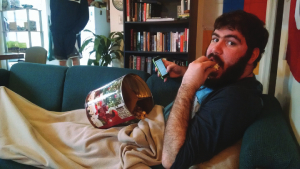
It’s hard to feel fully comfortable mourning the things we lost in 2020, and it’s hard to not make this feel like a premature memoriam for a year that just started. It feels silly to worry about the gym regiment I cannot access or the friends I can’t see when thousands of people are dying.
But I think it’s okay to mourn the simple things we miss. I miss a good face-to-face conversation. I miss having the endorphin release of a weekend and I mourn the projects that had to stop. I picked the wrong timeline to be an extrovert. There’s better things to watch than Tiger King. Watch a foreign film or something. Learn to make that Prison Sauce from Goodfellas. I’m growing my mustache out just because I like that shaving gives me another thing to do every day.
PAULINE MARTIN ‘90 / San Salvador, El Salvador
Pauline directs the master’s program in education policy and evaluation and conducts research in the effects of gang presence on education at Universidad Centroamericana José Simeón Cañas.
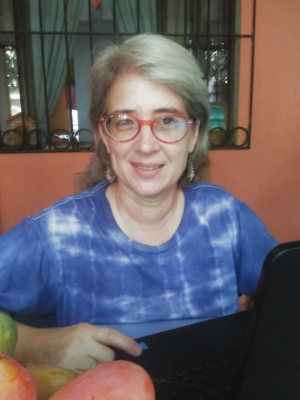
Every day begins the same: waking up to the bread seller’s bicycle horn, the neighbor’s rooster or a mango falling on the roof of our home in San Salvador. What a contrast to the loud alarm at 5:30 a.m. and the rush to get everyone out the door, then an hour-long trip in city traffic to travel eight kilometers! Life is slow and monotonous since March 21, yet time seems to fly by with the never-ending routines of work, study and housework.
Our mango tree is our blessing: In addition to serving as an impromptu alarm clock, it gives shade to our house in this dry season heat. This year has been an abundant mango year, but what can I do with so many mangos? Usually I share them with others, but this year I cannot. I pray others may enjoy mangos as well.
As in all parts of the world, crisis reveals inequality. We are privileged with our living conditions, but many Salvadorans work in the informal sector or have no pay in these months, live in crowded households and struggle with schooling their children.
I have been through several crises in El Salvador in the 27 years I’ve lived here: earthquakes, a volcano eruption, tropical storms, Zika and H1N1 influenza epidemics. What I have learned from my Salvadoran community is a resigned faith in God. When you cannot trust in government, weather, the health system or social safety nets, the only thing left to trust in is God. And the security of seasons that bring mangos, and that this too shall pass.
